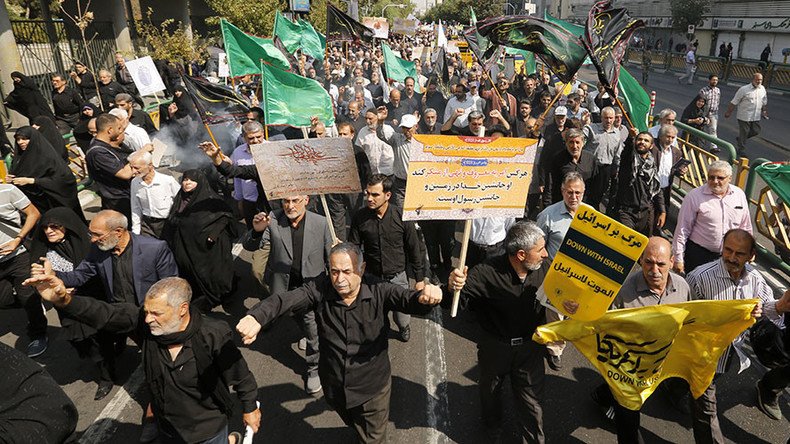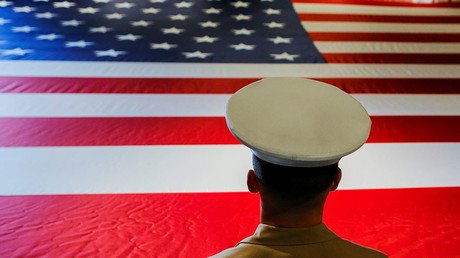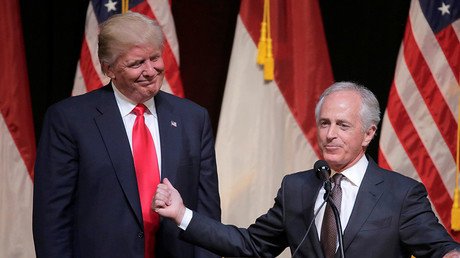May has ‘clear-eyed’ approach to Iran, but will she back Trump?

Donald Trump is teetering on the brink of a momentous decision on Iran, and Theresa May could be set to follow him off the proverbial cliff edge.
Downing Street confirmed on Monday that May has spoken with Israeli Prime Minister Benjamin Netanyahu ahead of a planned announcement from Washington on Iran – and how the Trump administration plans to deal with the country.
In an ambiguous message, a spokesperson for the prime minister said Britain and Israel agree on the need to be “clear-eyed” about the threat Iran poses.
However, it gave no detail on how Britain – once labelled “Little Satan” by Iran – will react.
The US president is preparing to announce “new” US responses to Iran’s alleged support for terrorism, cyber-operations and its nuclear weapons program.
Trump’s new Iran strategy is likely to be met with fury in Tehran. Experts suggest scrapping Barack Obama’s Iran deal could prompt a flurry of nuclear activity in the country.
“On the one hand it’s a bad deal. Israel and the United States must say that all the time,” said Yoaz Hendel, Netanyahu’s former director of communications.
“It’s a bad deal.”
“On the other hand, canceling the deal will mean that Iran will harden its position. It wants to be the regional hegemon, and it will want to prove itself.
"And I mean that in the Middle Eastern sense — militarily — not using the graces of European diplomacy.”
In the UK, May is communicating with allies in the Middle East, in the hope of formulating a response to the US move.
“They agreed that the international community needed to be clear-eyed about the threat that Iran poses to the Gulf and the wider Middle East, and that the international community should continue working together to push back against Iran’s destabilizing regional activity,” a spokesman said after the Netanyahu call.
Diplomatic ties between Iran and Britain have been shaky for decades.
In the 1979 Iranian Revolution Britain was accused both of propping up the shah and of plotting his downfall.
Later, Britain backed Iraq when Saddam Hussein attacked Iran in 1980.
The Joint Comprehensive Plan of Action (JCPOA) signed between Iran and the five permanent UN Security Council members in 2015 could be entirely derailed by Trump.
The US, UK, France, Germany, Russia and China co-signed the deal and Iran promised to dismantle its advancing nuclear program.
The deal was signed to ensure Iran uses its nuclear program exclusively for civilian purposes, in return for sanctions being lifted and billions of dollars in frozen assets released.
Britain and Iran restored full diplomatic relations in 2016, after the British embassy was raided and looted in Tehran in 2011.
However, the nations are supporting different sides in the Syrian civil war, with Iran backing President Bashar Assad.
President Hassan Rouhani was supported by William Hague, then-foreign secretary, who called for the embassy to be re-opened.
It is now completely unclear which way May will swing.
Now, as Trump is set to rock the status quo, Iran has come out fighting.
Suggestions that Trump could list the nation’s Revolutionary Guards as a terrorist group has enraged Iran.
“As we’ve announced in the past, if America’s new law for sanctions is passed, this country will have to move their regional bases outside the 2,000km range of Iran’s missiles,” Guards’ commander Mohammad Ali Jafari said, according to state media.
Jafari also said additional sanctions would end the chances for dialogue with the US and issued a warning to American troops.
“If the news is correct about the stupidity of the American government in considering the Revolutionary Guards a terrorist group, then the Revolutionary Guards will consider the American army to be like Islamic State [IS, formerly ISIS/ISIL] all around the world, particularly in the Middle East,” Jafari said.
The Revolutionary Guards (IRGC) is Iran’s most powerful internal and external security force.














